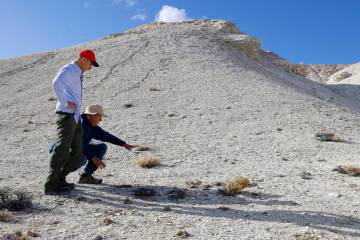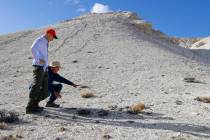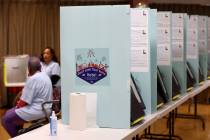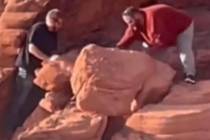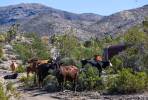GOP lawmakers call for new approach to wild horse overpopulation
Republicans in Congress want the Bureau of Land Management to answer for an "ineffective" strategy that has failed to halt the explosion of wild horse and burro populations both on the range and in captivity.
In a Nov. 4 letter to BLM director Neil Kornze, Sen. Dean Heller and Rep. Mark Amodei from Nevada and 18 other lawmakers requested a detailed report on what the agency is doing now and what it plans to do in the future to bring horse populations under control.
According to the letter, current strategies "have been largely unsuccessful" across the West, leading to overcrowding in BLM herd management areas and holding facilities, poor herd health and damage to range land.
"Almost half of the 100,000 horses under the purview of the Bureau of Land Management are located in holding facilities off the range, and adoptions have fallen by almost 70 percent in the last 10 years," the letter says.
The lawmakers are asking the BLM for details on birth control treatments, "humane euthanasia," roundups, adoptions and other efforts to shrink herds to the agency's own "appropriate management level" for the West, which calls for a total population of no more than 26,715 horses and burros across 10 states.
As of March 1, there were some 58,150 horses and burros living free on the range, more than half of them in Nevada, according to BLM estimates.
In addition to information on current efforts, Congressional Republicans want Kornze and company to produce four to six detailed plans, including timelines and cost estimates, to "effectively curb the overarching trend of overstocked" herd management areas.
BLM spokesman Craig Leff said the agency is still reviewing the inquiry from Congress and is "committed to improving the health of the horses and the land."
Leff said the bureau is already working to put its horse and burro program "on a more cost-effective, sustainable track" consistent with the recommendations of a 2013 report by the National Academy of Sciences that determined wild horse and burro populations on federal land in the West were growing at a rate of 15 to 20 percent annually.
"As part of our long-term strategy, the BLM in partnership with universities and the U.S. Geological Survey is developing more effective fertility control methods," Leff said in an email.
The agency is also "promoting public-private eco-sanctuaries or off-range pastures to hold excess wild horses removed from western public rangelands and working to boost adoptions by making more trained horses available to the public for adoption," Leff said.
The GOP letter comes two months after the BLM removed more than 200 wild horses said to be on the verge of starvation in the Spring Mountains northwest of Las Vegas. At least 28 of those animals collected from around the tiny community of Cold Creek were later killed because they were deemed too far gone to save.
The BLM's appropriate management level for the 102,000 acres surrounding Cold Creek is 66 adult horses. In May, the bureau counted about 470 horses in the area.
The BLM rounded up 250 horses from the same herd in 2007 and treated some of the remaining animals with birth control chemicals. One of those mares and her newborn foal were among the horses removed from the range in August.
Heller spokesman Michawn Rich said the federal government has a responsibility to address the wild horse issue, especially in Nevada, where almost 87 percent of the land is under federal control.
"Without proper and responsible management," said Rich in an email, "these wild horses will continue to suffer and have a devastating impact on range land, sage-grouse habitat, and other agricultural and natural resources."
Contact Henry Brean at hbrean@reviewjournal.com or 702-383-0350. Find him on Twitter: @RefriedBrean












